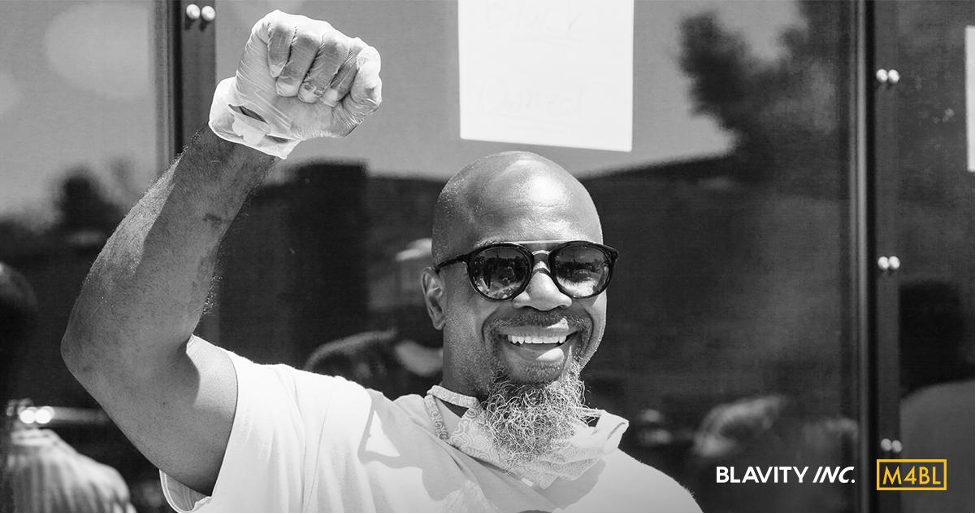The election is (finally) over, but it’s clear that the work required to end systemic oppression is not. While the incoming administration will no doubt mitigate some of the harm Black communities experienced over the last four years, those working in service of Black liberation will continue building power, holding officials accountable and moving us closer to a safe and just world. One of the most comprehensive descriptions of that better world is outlined in the Vision for Black Lives, the Movement for Black Lives’ (M4BL) policy agenda.
The Vision, first drafted in 2015, is a response to the increasing rates of state-sanctioned violence and criminalization of Black people in the U.S. and abroad. This proactive document is both a mandate and a road map for the community organizing and policy work happening around the nation. It encapsulates the necessary work that will allow all Black people the freedom to live in full dignity, have access to abundant resources and feel safe inside communities absent of violent and racist policing.
Created by a collective of 50 organizations within the 150-organization M4BL ecosystem, the platform features six core pillars:
- Ending the War on Black People
- Reparations
- Invest-Divest
- Economic Justice
- Community Control
- Political Power
After several years of building each pillar’s detailed policy demands, the Vision was relaunched in 2020. It now includes recommendations that address the realities of Black life during the Trump administration and the COVID-19 pandemic. “With the relaunch, we rearticulate our vision and policy demands with even more clarity from even more segments of the 21st-century Black Liberation Movement in the United States: Black-led members of the disability justice movement, the reproductive justice movement, Black people leading the fight for economic justice and building alternatives to the systems that harm our people, and more,” said Ash-lee Woodard Henderson, a leader of the M4BL Policy Table.
Many of the policies that live in this document, like defunding the police (Invest-Divest), are now cornerstones of the national discourse around ending systemic racism. Below is a snapshot of a few policies M4BL is pursuing locally and nationally.
Ending the War on Black Communities
Because of policies like the (failed) War on Drugs, the Black community has been decimated by sentencing inequality and substantial investments into the prison pipeline — more than $100 billion toward policing and another $80 billion toward jails and prisons. M4BL asserts that local communities can be better served by transferring that funding to key services like affordable housing, education, health care, a livable wage and public transformation. Additionally, diverting some of these funds into substance abuse and community-based mental health programs would reduce the need for police intervention during mental health crises.
Ending the war on Black families also requires acknowledging systemic racism’s impact on our justice system. This would mean providing reparations to families and other survivors of deportation, detention and police violence.
To achieve this, M4BL endorses initiatives like the End Qualified Immunity Act, designed to remove the qualified immunity doctrine as a grounds of defense for law enforcement. This would finally move the needle on holding rogue members of law enforcement accountable for their actions while on the job.
The Demilitarization of Law Enforcement
Ending the war on the Black community cannot be discussed without acknowledging how militarization empowers law enforcement to move with brutal force, especially when dealing with people or communities deemed “threatening.” For the Black community, this has meant years of criminalization and over-policing via discriminatory practices like stop and frisk.
Blatant militarization of law enforcement occurs in areas that over-invest in policing. This has resulted in countless unjust deaths of Black Americans and soaring incarceration rates that will influence our communities for generations. Immigration is also in the crosshairs, as agencies like ICE use their access to such equipment to terrorize immigrants while enforcing deportations.
M4BL calls for a ban on the use of military-grade equipment by Border Patrol and law enforcement officials, as well as an end to the transfer of military equipment between local and federal agencies. M4BL also endorses the Stop Militarizing Law Enforcement Act, a measure introduced by the House that would prevent the Department of Defense from moving extra military property and equipment to aid local, state or federal law enforcement agencies.
Ending Pretrial Detention and Money Bails
To properly address our justice system’s inequalities, the system itself will need a bit of unraveling. This is why the Movement for Black Lives endorses measures like the People’s Justice Guarantee, a proposal for rebuilding our federal justice system.
It also addresses ending pretrial detention and bail, something that disproportionately keeps low-income and minority offenders in jail for petty and low-level transgressions simply because they cannot afford bail. This unfair system has caused the U.S. prison population to explode by more than 500 percent in just 40 years.
In discussing this mission, Rep. Ayanna Pressley said, “You cannot have a government for and by the people if it is not represented by all of the people. For far too long, those closest to the pain have not been closest to the power, resulting in a racist, xenophobic, rogue and fundamentally flawed criminal legal system.”
Through this vision for Black America, the Movement for Black Lives network demands that Black communities are granted full freedom of political expression and participation — with an additional call to release political prisoners — and full access to voting rights. Within the voting process, M4BL advocates for the elimination of unfettered corporate donations and the encouragement of public financing in all elections. This vision also includes fair access to technology and increased funding and protection for Historically Black Colleges and Universities (HBCUs).
For the Movement for Black Lives, the Vision for Black America is worth fighting for, and they will continue to do just that.
To learn more about M4BL, or to join the network, visit here.
This editorial is brought to you in partnership with the Movement for Black Lives.
